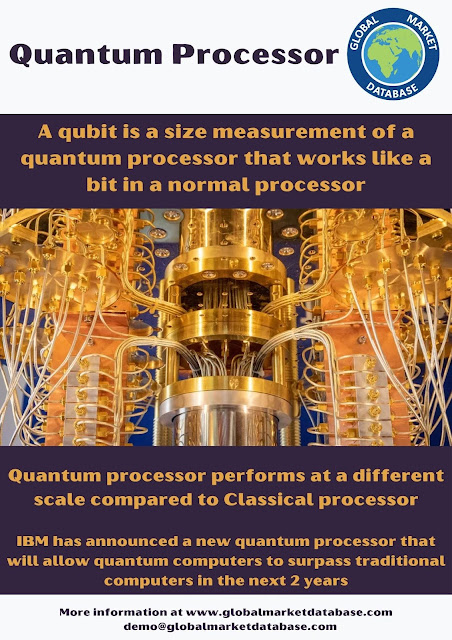Analysis of Quantum Processor Market Forecast
What is Quantum Processor?
Quantum computers have the potential to solve problems that could be world-changing such as the design of new medicines or ways to solve the world’s energy problems. So companies have developed a processor that can realize a goal using readily available silicon chip technology. Modern-day computer chips already contain billions of identical transistors crammed onto a square centimeter of silicon each one less than 20 nanometers in size which is a thousand times smaller than the width of a human hair.
In 2015, the researchers found a solution to convert the silicon transistors found on computer chips into qubits and demonstrated 1st quantum logic calculations between two silicon qubits. The reason because quantum processors require millions of qubits to solve really difficult problems is that even small errors can lead to incorrect answers. This is why error-correcting codes, which utilize multiple qubits to store information, are required to store a single bit of information.
Major players in the quantum processor market
Recently IBM has announced a new quantum processor that will allow quantum computers to surpass traditional computers in the next 2 years. The new quantum processor has been named Eagle and it had 127 qubits making it 1st processor with more than 100 qubits, this was followed by a hummingbird that was launched last year. The company plans to develop ‘Osprey’ and ‘Condor’ chips with 433 and 1121 qubits respectively.
Google, claimed to achieve quantum supremacy with its quantum processor ‘sycamore’, which is based on transmon superconducting qubits. The company said it can perform a task in 200 seconds that supercomputer would take 10,000 years to complete.
Intel is another major player in the market. They are based in California, United State. The company has announced its 49-qubits processor named ‘Tangle Lake’ in partnership with a Dutch company, QuTech and Delft University of technology. Canada-based startup Xanadu has developed an X24 quantum processor with 24-qubits in collaboration with menicucci.
Microsoft in collaboration with the University of Sydney has developed a quantum controlling platform named gooseberry that allows scaled-up support for thousands of qubits. Some of the other market players are D-wave, Rigetti computing, Fujitsu, origin quantum computing technology, and Ion Q.
Quantum supremacy
Over the past few decades, science has evolved from mathematical speculation to multibillion-dollar hardware projects that will, one day soon, be able to model complex systems, decrypt sensitive data, and recognize deep patterns in living systems. While quantum processes effects are also contributing to the development of new material that can be useful for innovation in various sectors
All these things are moving much faster than expected as quantum technology has evolved with a major focus on making better and better qubits. The new processor paves the way for scalable quantum computing, as the companies plan to increase the area and number of qubits in the design. Despite the quantum processor's superior performance in performing complex tasks, it is still lacking in several aspects that classical processors can do. Therefore, there is plenty of room for collaboration between classic and quantum. As science and technology make such breakthroughs, the future will most certainly benefit from quantum processors.
Global Market Database is your one-source destination for all of your market research needs. It covers the market Trends of Quantum Processor . Login to the global market database and access a 10-year market forecast, regional market forecast and top 20 country market analysis for the same. Register now and access 10 year Global market forecast data for 5 markets free.
Read the full blog here:- https://globalmarketdatabase.com/quantum-processor-market-forecast/




Comments
Post a Comment